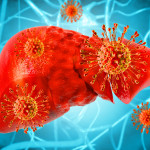Treating hepatitis C virus (HCV) among people with HIV was associated with an improvement in a composite assessment of overall health and mortality risk but not with any change in cognitive function in a recent small study.
Researchers conducted a study of 62 people with HIV and HCV who were beginning treatment for the latter virus. They gave the participants a neuropsychiatric assessment before starting them on hep C therapy and again 12 to 24 weeks after the completion of treatment. They also calculated the participants’ scores on what is known as a VACS Index before starting them on hep C treatment and six months after the treatment’s completion.
The VACS Index draws upon various indicators of health among people with HIV or HCV to provide an estimate of the risk of death from all causes.
Findings were presented at the 2017 Conference on Retroviruses and Opportunistic Infections (CROI) in Seattle.
Among the 62 participants, 74 percent were male, the median age was 54, 85 percent were injection drug users, all were on antiretroviral (ARV) treatment for HIV, the median CD4 count was 563 and 83 percent had an undetectable HIV viral load. Eleven of them had mild or moderate liver fibrosis, 13 had advanced fibrosis and 39 had cirrhosis.
Before starting hep C treatment, 23 of the participants had neurocognitive impairment. The researchers did not see any change over time in indicators of neuropsychiatric health after the participants received HCV therapy. This held true when restricting the analysis to only those who were ultimately cured of hep C.
Before treatment, the median VACS score was 42, which predicts a 20.4 percent risk of dying from any cause within five years. After treatment, the median score dropped to 27, predicting a 10.2 percent risk of death within five years. Looking just at those who were cured of hep C, the researchers found the median VACS score fell from 42 to 23, predicting an 8.2 percent risk of death within five years for the latter figure.







Comments
Comments